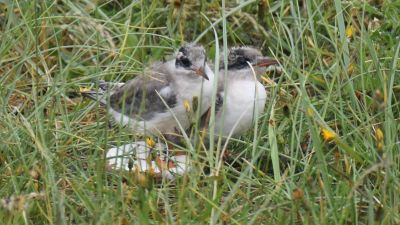Bird flu: Hundreds of dead Arctic tern chicks found at Long Nanny, Northumberland

Hundreds of dead chicks have been recovered from a beauty spot following a suspected outbreak of bird flu.
The National Trust said about a quarter of this year's Arctic tern chicks have been wiped out at Long Nanny, on the Northumberland coast.
Rangers have removed more than 600 dead chicks over the last two weeks.
Long Nanny, at Beadnell Bay, is home to Britain's largest mainland breeding colony of Arctic terns, with 1,600 breeding pairs this year.
It is also a significant site for little terns, which are Britain's second rarest breeding seabird.
The National Trust said it expects the results of tests for bird flu in the next 10 days.
James Porteus, lead ranger at Long Nanny says: “The season started so well, with over 1,600 pairs of Arctic terns returning to breed this season – the highest number of breeding pairs at the site since 2018, and we had recorded 2,600 eggs.
"But, a couple of weeks ago we started to notice that some of the chicks were dying and since then we have picked up over 600 dead Arctic tern chicks from across the site.
“We have also started to discover some dead adults now which is equally heartbreaking and worrying. Although we have been monitoring for and removing dead birds throughout the breeding season, we fear that an infected bird may have got into the colony and infected our breeding Arctic terns."
Activities which could disturb the colony, like clutch counts or raising nests above the high tide mark, have been suspended.
Last year, bird flu caused more than 6,000 seabird deaths on the nearby Farne Islands, which lie off the Northumberland coast.
So far this year fewer dead birds have been found on the islands, with 500 carcasses recovered to date.
The National Trust said the number of dead birds had increased in recent days, with species picked up including kittiwakes, black headed gulls and guillemots.
Tests are being carried out to see if the deaths are due to bird flu.
Mr Porteus said he hopes little terns at Long Nanny will remain unaffected.
He said: “So far, we’ve only discovered one dead adult little tern and observed one poorly chick so let’s hope the fact that they nest separately from the Arctic terns will give them some chance of survival.
“These rare seabirds which are already under such huge pressures from climate change now face even bigger challenges – but we are here and ready to do whatever we can to help – and we’re working closely with our team on the Farne Islands to share learnings and best practice.”
The team expects to have the test results back from Defra to confirm if the cause of the deaths is bird flu in the next 10 days.
Ben McCarthy, head of nature conservation and restoration ecology at the National Trust said: “After last year’s outbreak of bird flu on the Farne Islands, when Long Nanny was unaffected, we were really hopeful that the colony would escape the worst of this deadly disease. However, this news, is devastating for these vulnerable birds and it will take years for the populations to recover.
“Seabirds are particularly vulnerable because they are long lived and have low productivity which means any reduction in breeding adults, or maturing young birds can have a very significant impact on whole populations.
“We are working with our partners to get a better understanding of the long-term impact of bird flu on our globally important seabird populations and supporting our ranger teams who have been working so hard to protect and build numbers of these special birds."
Visitors to the area are advised to avoid disturbing the birds at Long Nanny by keeping a safe distance and keeping dogs on a short lead.
Footpaths are located at entry and exit points to the site to allow visitors to disinfect their footwear as the rangers do all they can to reduce transmission of the disease.
Want a quick and expert briefing on the biggest news stories? Listen to our latest podcasts to find out What You Need To Know...